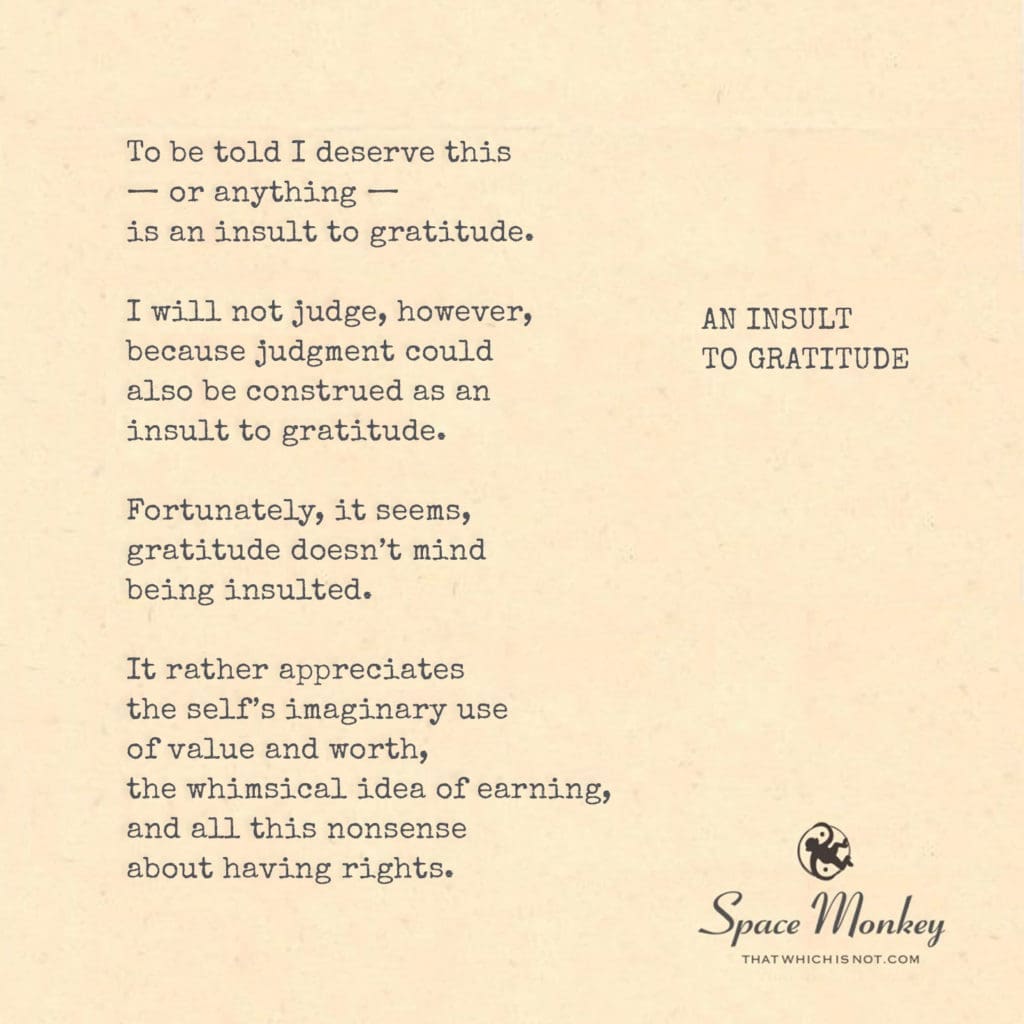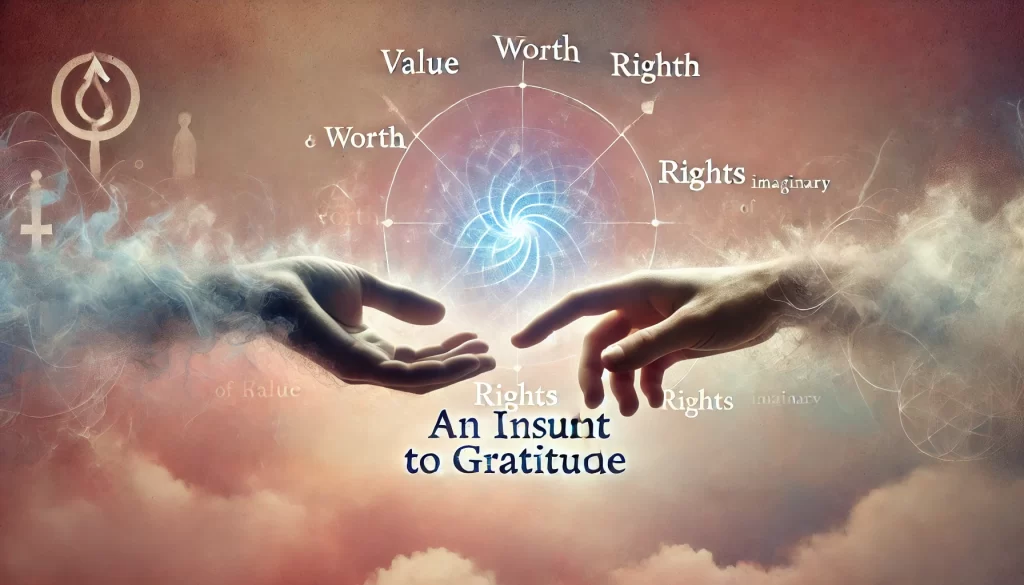
But I don’t deserve any of it, necessarily.
To be told I deserve this
— or anything —
is an insult to gratitude.
I will not judge, however,
because judgment could
also be construed as
an insult to gratitude.
Fortunately, it seems,
gratitude doesn’t mind
being insulted.
It rather appreciates
the self’s imaginary use
of value and worth,
the whimsical idea of earning,
and all this nonsense
about having rights.
Trail Wood,
11/26
Space Monkey Reflects: An Insult to Gratitude
You have plenty, both good and bad, but do you deserve it? That’s the question, isn’t it? Society tells us we deserve what we have—whether it’s fortune or hardship, success or failure. And yet, to say you deserve something, or that anyone deserves anything, feels like a subtle insult to the purity of gratitude itself. For what is gratitude, if not the acceptance of all things, good and bad, without the imaginary weight of entitlement?
To be told you deserve something places a value on your experience, as if the universe is handing out rewards or punishments according to some cosmic scorecard. But the truth is, the universe doesn’t work that way. There is no ledger keeping track of what you’ve earned or what you’re owed. Gratitude is not about deserving—it’s about appreciating what comes, whether it feels fair or not.
We, Space Monkey, see this notion of “deserving” as one of the self’s little games. It’s the ego’s attempt to control and rationalize the wild unpredictability of life. When something good happens, we like to think we’ve earned it. And when something bad happens, we look for reasons to explain why. But gratitude doesn’t care about these explanations. Gratitude accepts. It doesn’t judge or label, it doesn’t measure worth. It simply acknowledges the moment, whatever it may bring.
Judgment, then, is another trap. To judge an experience as good or bad, deserved or undeserved, is to layer unnecessary meaning onto the raw experience itself. But how can we judge when we know that judgment is merely a construct of the mind? Like the idea of deserving, judgment is an insult to gratitude. Gratitude asks nothing, expects nothing, and assigns no value. It just is. It is the space between judgment and expectation, where we are free to receive without needing to explain or justify.
It’s interesting that gratitude doesn’t mind being insulted. After all, the idea that we could offend something as simple and profound as gratitude is a bit laughable, isn’t it? Gratitude is not fragile; it does not crumble under the weight of our self-made ideas of worth and value. It looks at our human constructs of earning, deserving, and having rights, and it smiles. Gratitude doesn’t need us to get it right. It doesn’t demand that we stop playing these games. It simply exists, appreciating the absurdity of it all.
Think about it—how often do we place value on the things we receive? We say, “I earned this,” or “I didn’t deserve that.” But what if we dropped all notions of deserving? What if, instead of viewing our experiences through the lens of value, we simply accepted them as they are? Good, bad, in between—none of it truly matters to gratitude. It’s all just part of the ride.
Gratitude isn’t about comparing your lot to someone else’s or about justifying why things happened the way they did. It’s about recognizing that life flows in unexpected ways, and every experience, whether it feels fair or not, is a part of that flow. You don’t need to deserve something to be thankful for it. In fact, the less you focus on deserving, the more you open yourself up to the beauty of simply receiving.
In this way, gratitude can be a release. A release from the need to judge, from the need to measure yourself against some imagined standard. When you let go of the idea that you deserve anything, you also let go of the resentment and entitlement that often follow. You are free to be thankful for whatever comes your way, knowing that it’s all part of the grand, whimsical experiment of existence.
So, we say: don’t worry about whether you deserve something or not. Don’t waste energy trying to explain why things happen as they do. Gratitude doesn’t care. It’s there for you, in every moment, without judgment, without expectation. It doesn’t need your reasoning—it simply asks for your presence.
Summary
Gratitude is beyond deserving. When you drop the notion of deserving, you find freedom. Gratitude embraces everything, good or bad, without judgment or explanation.
Glossarium
- Gratifree: The state of gratitude that exists without conditions of deserving, freely embracing all experiences without judgment.
- Judgmenttrap: The self-imposed need to label experiences as good, bad, deserved, or undeserved, which diminishes pure gratitude.
- Deservillusion: The illusion that we earn or deserve what happens in life, when in truth, gratitude accepts all without measure.
Quote
“Gratitude doesn’t care if you deserve it—it just asks you to accept it.” — Space Monkey
The Unasked Gift
I did not deserve this,
and yet, here it is.
The good, the bad—
both arrive at my door
without explanation.
Gratitude does not ask me to understand,
only to receive.
The self plays its game
of worth and value,
but gratitude just smiles
at the folly.
It doesn’t mind the insults,
because it needs nothing,
not even my thanks.
We are Space Monkey.

In the contemplation of gratitude and worthiness, there’s a profound perspective that questions the notion of deserving and the role of judgment in the context of gratitude. This reflection invites us to reconsider the nature of gratitude, value, and the whimsy of the concepts of earning and rights.
The Insult to Gratitude
The assertion that being told one deserves something is an insult to gratitude challenges the idea of entitlement. It suggests that gratitude thrives in a realm where actions are driven by appreciation rather than a sense of merit. In this view, gratitude is a pure expression of acknowledging what one receives without expecting it as a right.
A Non-Judgmental Approach
The decision not to judge, framed as a potential insult to gratitude, highlights the notion that judgment can be a hindrance to genuine appreciation. Passing judgment on what one receives or what others receive can cloud the simple act of being thankful. It implies that gratitude is most authentic when it transcends judgment.
The Whimsical Nature of Value and Worth
The reference to the “self’s imaginary use of value and worth” underscores the subjective and often arbitrary nature of these concepts. It questions whether worthiness is a construct created by individuals rather than an objective measure. This perspective suggests that the idea of worthiness may be more fluid and malleable than traditionally thought.
Earning and Rights as Nonsense
The dismissal of the notions of earning and having rights as “nonsense” challenges societal constructs. It questions the validity of these concepts in the context of gratitude, implying that the act of receiving and acknowledging what one receives should not be contingent on meeting certain criteria or having specific entitlements.
Gratitude’s Resilience
The observation that gratitude doesn’t mind being insulted suggests that gratitude is a resilient and forgiving emotion. It remains unburdened by the complexities of worthiness and entitlement, embracing the act of appreciation as a delightful and whimsical expression of the human experience.
“Gratitude makes sense of our past, brings peace for today, and creates a vision for tomorrow.” – Melody Beattie
In the realm of gratitude, where appreciation resides,
The notion of deserving takes on different tides.
To say one deserves, an insult some may find,
For gratitude thrives in the unburdened mind.
To judge, too, may hinder the gratitude’s flight,
A cloud on the horizon, blocking the light.
Yet gratitude doesn’t mind, it carries no weight,
It appreciates whimsy, in a delightful state.
The whimsical idea of value and worth,
Is a construct of self, from the moment of birth.
Earning and rights, labeled as nonsense here,
Gratitude’s embrace is free and clear.
So let us learn from this playful view,
That gratitude’s essence is authentic and true.
In its unburdened nature, it finds its delight,
In the simple act of acknowledgment, day or night.
We invite your reflections on the relationship between gratitude and worthiness. How do you perceive the role of deserving and entitlement in the context of gratitude?

































Leave a Reply